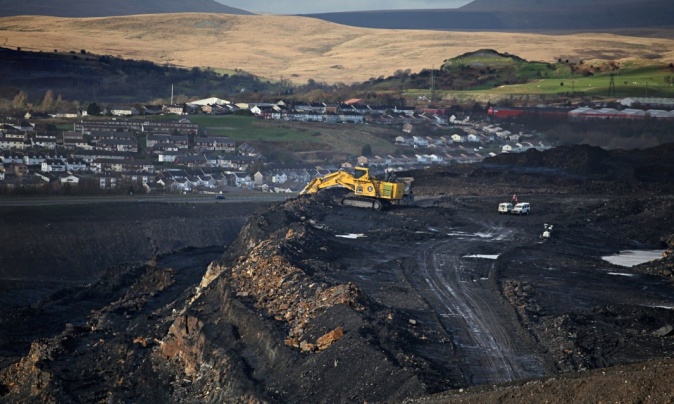Wrapped up in this story is everything that’s wrong with the way our economy works. Corporations ream the land with giant holes, extract a stack of money, then clear out, leaving other people with the costs. There’s a briefer description: legalised theft.

This is an account, scarcely mentioned in the national media, of the massive unfunded liabilities emerging from coalfields throughout Britain, that opencast mining companies have been allowed to walk away from.
It’s comparable in terms of irresponsibility to the failure by the nuclear industry to fund its decommissioning costs. And it offers a solid argument, even to those who continue to reject climate science, for keeping fossil fuels in the ground.
As I write, Neath-Port Talbot Council in South Wales is considering a new application for an opencast coal mine. The mine is unpopular, but its proponents argue that it’s necessary. Why?
Because only by digging a new pit, they say, can the money be made to fill in an old one. How could this be true, when millions of tonnes of coal have been extracted? Where did the money go? You think you are inured to the worst of British politics? Read on.
When British Coal was privatised by John Major’s government in 1994, the company that took over in South Wales, Celtic Energy, was granted a 10-year exemption from paying a restoration bond, in return for offering a slightly higher price for the assets. That higher price disappeared into national accounts, doubtless in the form of one of Mr Major’s tax cuts for the rich.
After 10 years, the exemption expired, and Celtic Energy had to start putting up a decommissioning fund.
At East Pit, where the application for new mining is now being considered, the bond now stands at around £4m, while the restoration is likely to cost about £115m.
At another vast pit, Margam, near Bridgend, there is £5.7m in the kitty – against an estimated restoration cost of £56m.
In 2010 Celtic Energy sold the land rights, and the liabilities, at East Pit, Margam and two other mines, to a company in the British Virgin Islands called Oak Regeneration, for £1 per mine. Oak Regeneration then passed the liabilities to Pine Regeneration, Beech Regeneration and Ash Regeneration, none of which appear to have the assets required for restoration. Five senior executives at Celtic Energy walked away with benefits worth more than £10m.
The people involved in this transfer, including two directors of Celtic Energy and the former chief executive of Cardiff City Council, were charged with fraud. But last year the judge threw out the case, saying that, while some might regard their actions as “dishonest” or “reprehensible”, they were not illegal.
So all that is left, the opencasters argue, is to dig more holes. It’s like the old woman who swallowed a fly.
In a paper commissioned by the Welsh government, I was struck by the mention of the Ffos-y-fran opencast coal mine, on which I reported in 2007. This pit was justified as a “restoration scheme”, which would remove the old adits, shafts and spoil heaps left behind by deep mining. Local people were sceptical: one of them told me “you don’t go down 600ft and blast 5 days a week to reclaim an area.”
But the report finds that the bond laid down by Ffos-y-fran’s operators, £15m, “falls well short of a worst case restoration cost which could be in excess of £50m”.
The “restoration scheme”, this suggests, cannot fund its own restoration.
In some cases, villages and towns find themselves perched on the edge of sheer drops, overlooking running black sores sometimes hundreds of metres wide.
At Margam, for example, the pit is some 2km across and, according to the latest estimate I’ve seen, the water gathering there is 88m deep. In East Ayrshire, in Scotland, 22 giant voids have been abandoned by their operators. Restoration work there would cost £161m, but just £28m has been set aside. As the local MP explained, “they are so large they cannot be effectively secured from trespass… unstable head walls and extremely deep water bodies with vertical drop-offs make for dangerous playgrounds.”
An independent report found that the collection of restoration bonds by East Ayrshire Council officials was “wholly deficient and defective”, while the failure to appoint independent assessors was “completely inexplicable”. While officials took their eye off the ball, East Ayrshire councillors took gifts and hospitality from the coal operators, including a trip to watch Celtic play Barcelona in Spain, premier league tickets, lavish meals, food hampers and nights in hotels. When the two companies running the pits went bust, the council was left in a gigantic hole.
Nationwide, the unfunded liabilities counted so far amount to £469m. That’s likely to be just the beginning.
This is a price we pay for limited liability. Why should the people who own and run these companies be allowed to walk away with millions, while shrugging off the costs they leave behind? Limited liability is one of our social silences: a giant gift to corporations that we won’t even discuss.
And why are we digging coal anyway, when we cannot afford to burn it? Climate breakdown is the greatest unfunded liability of all, for which future generations will have to pay.
Yet in 2013, the latest year for which figures are available, the amount of coal for which companies in Britain have permission to dig rose from 12m tonnes to 24m.
Eight new opencast pits were approved in that year, and only three rejected. In which parallel universe is this compatible with the commitment to limit climate change?
Last week, lost in the election turmoil, the Welsh Senedd did something remarkable. It voted, by 30 votes to zero, for a moratorium on opencast coal mining. With the Welsh ban on fracking, this could have meant that Wales was the first nation on earth to keep its fossil fuels in the ground.
But the Welsh government refused to accept the decision, using the restoration argument. Past crimes are used to justify new ones.
Fire and forget: that’s the psychopathic business model we confront, and the forgetting is assisted by the press and political leaders.
To them, the victims are non-people, the ruined landscapes non-places. All that counts is the money.
www.monbiot.com

